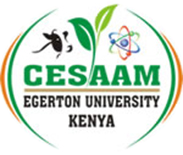Global Engagement Research Experience and Extension in Kenya: Summer 2025
An exciting international academic collaboration is set to unfold in Summer 2025 under the title "Global Engagement Research Experience and Extension in Kenya". This enriching exchange program is designed to provide undergraduate students from the United States with hands-on, interdisciplinary research experience in Kenya’s agricultural, environmental, and biological sciences sectors.
Hosted by leading Kenyan universities and supported by U.S. institutions, the program merges high-impact research with cultural immersion and professional development. It combines two key components: the NSF-Funded Research Experience for Undergraduates (REU) and the NIFA-USDA Funded Research and Extension Experience for Undergraduates (REEU).
Research Focus Areas
[A] NSF-Funded Research Experience for Undergraduates (REU)
A total of 8 students will be engaged in research areas including:
-
Promoting Sorghum Production – exploring its potential for food, feed, and industrial use.
-
Enhancing Forgotten Crops Using Endophytes and Biochar – improving resilience and productivity of neglected crops.
-
Biochar as a Biofertilizer Carrier – assessing its effects on the growth of underutilized millets and their potential in infant nutrition.
[B] NIFA-USDA Funded Research and Extension Experience for Undergraduates (REEU)
6 students will take part in research that includes:
4. Aquaponics and Probiotic Fish Feed – isolating Lactobacillus from fish for aquaponic systems.
5. Endohelminths in Commercial Fish – evaluating parasitic infections in Nile tilapia and African catfish.
6. Bioconversion of Agricultural Waste – using microbial enzymes to reduce methane and improve livestock feed.
7. Innovation Platforms for Dairy Fodder – improving fodder production in smallholder dairy systems.
Key Dates & Program Structure
-
Recruitment and Pre-travel Preparation: February – March 2025
-
Virtual Boot Camp & Orientation (USA): May 7 – 28, 2025 (weekly online sessions)
-
Travel to Kenya: June 3 – 4, 2025
-
Jet Lag Adjustment & Transit to Egerton: June 5 – 7, 2025
-
Orientation & Research Commencement: June 9, 2025
-
Official Opening: June 16, 2025
-
Research Duration: June 9 – July 30, 2025
-
Symposium & Closing Ceremony: July 25, 2025
-
Departure to USA: July 29 – 30, 2025
Weekly Highlights
-
Weekends: Cultural activities, shopping, and leisure (Nairobi/Nakuru)
-
Educational Trips:
-
June 14: Lake Nakuru National Park & Lord Egerton Castle
-
July 18–20: Scenic tour of the Rift Valley and Western Kenya
-
July 26–28: Maasai Mara Safari (optional, self-funded)
-
Research & Academic Activities
-
Daily Mentor Meetings: Monday to Thursday, 9:00–10:00 AM (at least 2x/week; virtual participation acceptable)
-
Research Forums (Alternate Thursdays):
-
June 12, June 26, July 10, July 24
-
Each student will present 5-slide research progress summaries.
-
-
Professional Development Workshops (Alternate Wednesdays):
-
Topics: Introduction to Kiswahili, Ethics in Science, Scientific Writing, Graduate Study Opportunities in Africa, and Presentation Skills.
-
-
Proposal & Paper Writing Workshops (Mondays):
-
June 9: Orientation and Mentorship Introduction
-
June 16: Literature Review & Introduction (Research Questions & Hypothesis)
-
June 23: Materials & Methods
-
June 30: Results
-
July 14: Discussion & Conclusions
-
July 21: Final Paper & Poster Submission
-
July 25: Symposium Presentation
-
Field & Laboratory Experiences
-
Lab Visits (Fridays):
-
July 3: International Livestock Research Institute (ILRI)
-
July 4: International Centre of Insect Physiology and Ecology (ICIPE)
-
July 4 Evening: Cultural Visit to Bomas of Kenya
-
-
Sample Collection Field Trips:
Each lab group will conduct at least one sample collection trip relevant to their research, with coordination and support provided by the hosting faculty. Other students may join at their own cost.
A Transformative Academic and Cultural Experience
This global engagement initiative blends rigorous scientific research with real-world agricultural challenges in East Africa. Participants will not only contribute to solutions addressing food security, sustainable agriculture, and environmental conservation but also gain invaluable intercultural and professional skills.
The program is a gateway to global scholarship, community impact, and transformative personal growth for the next generation of agricultural, biological, and environmental scientists.





